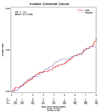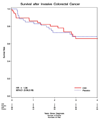Conjugated equine estrogens and colorectal cancer incidence and survival: the Women's Health Initiative randomized clinical trial - PubMed (original) (raw)
Randomized Controlled Trial
. 2008 Oct;17(10):2609-18.
doi: 10.1158/1055-9965.EPI-08-0385. Epub 2008 Sep 30.
Janet L Stanford, LieLing Wu, James M Shikany, Robert E Schoen, Marcia L Stefanick, Vicky Taylor, Cedric Garland, Gail Frank, Dorothy Lane, Ellen Mason, S Gene McNeeley, Joao Ascensao, Rowan T Chlebowski; Women's Health Initiative Investigators
Collaborators, Affiliations
- PMID: 18829444
- PMCID: PMC2937217
- DOI: 10.1158/1055-9965.EPI-08-0385
Randomized Controlled Trial
Conjugated equine estrogens and colorectal cancer incidence and survival: the Women's Health Initiative randomized clinical trial
Cheryl Ritenbaugh et al. Cancer Epidemiol Biomarkers Prev. 2008 Oct.
Abstract
Background: In separate Women's Health Initiative randomized trials, combined hormone therapy with estrogen plus progestin reduced colorectal cancer incidence but estrogen alone in women with hysterectomy did not. We now analyze features of the colorectal cancers that developed and examine the survival of women following colorectal cancer diagnosis in the latter trial.
Participants and methods: 10,739 postmenopausal women who were 50 to 79 years of age and had undergone hysterectomy were randomized to conjugated equine estrogens (0.625 mg/d) or matching placebo. Colorectal cancer incidence was a component of the monitoring global index of the study but was not a primary study endpoint. Colorectal cancers were verified by central medical record and pathology report review. Bowel exam frequency was not protocol defined, but information on their use was collected.
Results: After a median 7.1 years, there were 58 invasive colorectal cancers in the hormone group and 53 in the placebo group [hazard ratio, 1.12; 95% confidence interval (95% CI), 0.77-1.63]. Tumor size, stage, and grade were comparable in the two randomization groups. Bowel exam frequency was also comparable in the two groups. The cumulative mortality following colorectal cancer diagnosis among women in the conjugated equine estrogen group was 34% compared with 30% in the placebo group (hazard ratio, 1.34; 95% CI, 0.58-3.19).
Conclusions: In contrast to the preponderance of observational studies, conjugated equine estrogens in a randomized clinical trial did not reduce colorectal cancer incidence nor improve survival after diagnosis.
Figures
Figure 1
Invasive Colorectal Cancer Incidence by Randomization Group
Figure 2
Survival Following Diagnosis of Invasive Colorectal Cancer By Randomization Group
Similar articles
- Health outcomes after stopping conjugated equine estrogens among postmenopausal women with prior hysterectomy: a randomized controlled trial.
LaCroix AZ, Chlebowski RT, Manson JE, Aragaki AK, Johnson KC, Martin L, Margolis KL, Stefanick ML, Brzyski R, Curb JD, Howard BV, Lewis CE, Wactawski-Wende J; WHI Investigators. LaCroix AZ, et al. JAMA. 2011 Apr 6;305(13):1305-14. doi: 10.1001/jama.2011.382. JAMA. 2011. PMID: 21467283 Free PMC article. Clinical Trial. - Lung cancer among postmenopausal women treated with estrogen alone in the women's health initiative randomized trial.
Chlebowski RT, Anderson GL, Manson JE, Schwartz AG, Wakelee H, Gass M, Rodabough RJ, Johnson KC, Wactawski-Wende J, Kotchen JM, Ockene JK, O'Sullivan MJ, Hubbell FA, Chien JW, Chen C, Stefanick ML. Chlebowski RT, et al. J Natl Cancer Inst. 2010 Sep 22;102(18):1413-21. doi: 10.1093/jnci/djq285. Epub 2010 Aug 13. J Natl Cancer Inst. 2010. PMID: 20709992 Free PMC article. Clinical Trial. - Conjugated equine estrogens and incidence of probable dementia and mild cognitive impairment in postmenopausal women: Women's Health Initiative Memory Study.
Shumaker SA, Legault C, Kuller L, Rapp SR, Thal L, Lane DS, Fillit H, Stefanick ML, Hendrix SL, Lewis CE, Masaki K, Coker LH; Women's Health Initiative Memory Study. Shumaker SA, et al. JAMA. 2004 Jun 23;291(24):2947-58. doi: 10.1001/jama.291.24.2947. JAMA. 2004. PMID: 15213206 Clinical Trial. - Estrogen therapy and breast cancer in randomized clinical trials: a narrative review.
Pan K, Lavasani S, Aragaki AK, Chlebowski RT. Pan K, et al. Menopause. 2022 Sep 1;29(9):1086-1092. doi: 10.1097/GME.0000000000002021. Epub 2022 Aug 16. Menopause. 2022. PMID: 35969882 Review. - Breast Cancer and Menopausal Hormone Therapy by Race/Ethnicity and Body Mass Index.
Chlebowski RT, Anderson GL, Aragaki AK, Prentice R. Chlebowski RT, et al. J Natl Cancer Inst. 2015 Nov 5;108(2):djv327. doi: 10.1093/jnci/djv327. Print 2016 Feb. J Natl Cancer Inst. 2015. PMID: 26546117 Free PMC article. Review.
Cited by
- Changing Colorectal Cancer Trends in Asians: Epidemiology and Risk Factors.
Pardamean CI, Sudigyo D, Budiarto A, Mahesworo B, Hidayat AA, Baurley JW, Pardamean B. Pardamean CI, et al. Oncol Rev. 2023 May 22;17:10576. doi: 10.3389/or.2023.10576. eCollection 2023. Oncol Rev. 2023. PMID: 37284188 Free PMC article. Review. - Colorectal Cancer Chemoprevention: A Dream Coming True?
Lepore Signorile M, Grossi V, Fasano C, Simone C. Lepore Signorile M, et al. Int J Mol Sci. 2023 Apr 20;24(8):7597. doi: 10.3390/ijms24087597. Int J Mol Sci. 2023. PMID: 37108756 Free PMC article. Review. - Reproductive Factors in Relation to Incidence of Lung and Colorectal Cancers in a Cohort of Norwegian Women: The HUNT Study.
Denos M, Sun YQ, Brumpton BM, Langhammer A, Chen Y, Mai XM. Denos M, et al. J Endocr Soc. 2022 Nov 12;7(1):bvac175. doi: 10.1210/jendso/bvac175. eCollection 2022 Nov 17. J Endocr Soc. 2022. PMID: 36466004 Free PMC article. - An analysis of sexual dimorphism in the tumor microenvironment of colorectal cancer.
Geddes AE, Ray AL, Nofchissey RA, Esmaeili A, Saunders A, Bender DE, Khan M, Aravindan S, Ahrendsen JT, Li M, Fung KM, Jayaraman M, Yang J, Booth KK, Dunn GD, Carter SN, Morris KT. Geddes AE, et al. Front Oncol. 2022 Oct 28;12:986103. doi: 10.3389/fonc.2022.986103. eCollection 2022. Front Oncol. 2022. PMID: 36387163 Free PMC article. - The Prediction of Peritoneal Carcinomatosis in Patients with Colorectal Cancer Using Machine Learning.
Bejan V, Dragoi EN, Curteanu S, Scripcariu V, Filip B. Bejan V, et al. Healthcare (Basel). 2022 Jul 29;10(8):1425. doi: 10.3390/healthcare10081425. Healthcare (Basel). 2022. PMID: 36011082 Free PMC article.
References
- Jemal A, Siegel R, Ward E, et al. Cancer Statistics, 2007. Ca Cancer J Clin. 2007;57:43–66. - PubMed
- Baron JA, Beach M, Mandel JS, et al. Calcium supplements for the prevention of colorectal adenomas. N Engl J Med. 1999;340:101–107. - PubMed
- Steinbach G, Lynch PM, Phillips RKS, et al. The effect of celecoxib, a cyclooxygenase 2 inhibitor, in familial adenomatous polyposis. N Engl J Med. 2000;342:1946–1952. - PubMed
- Sandler RS, Halabi S, Baron JA, et al. A randomized trial of aspirin to prevent colorectal adenomas in patients with previous colorectal cancer. N Engl J Med. 2003;348:883–890. [Erratum, N Engl J Med 2003;348: 1939.] - PubMed
- Labayle D, Fischer D, Vielh P, et al. Sulindac causes regression of rectal polyps in familial adenomatous polyposis. Gastroenterology. 1991;101:635–639. - PubMed
Publication types
MeSH terms
Substances
LinkOut - more resources
Full Text Sources
Medical

